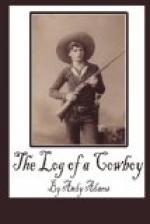The trail followed the Sweet Grass down to the Yellowstone; and until we reached it, whenever there were creeks to ford or extra pulls on hills, half a dozen of us would drop back and lend a hand from our saddle pommels. The gradual decline of the country to the river was in our favor at present, and we should reach the ford in two days at the farthest, where we hoped to find a wheelwright. In case we did not, our foreman thought he could effect a trade for a serviceable wagon, as ours was a new one and the best make in the market. The next day Flood rode on ahead to Frenchman’s Ford, and late in the day returned with the information that the Ford was quite a pretentious frontier village of the squatter type. There was a blacksmith and a wheelwright shop in the town, but the prospect of an exchange was discouraging, as the wagons there were of the heavy freighting type, while ours was a wide tread—a serious objection, as wagons manufactured for southern trade were eight inches wider than those in use in the north, and therefore would not track on the same road. The wheelwright had assured Flood that the wheel could be filled in a day, with the exception of painting, and as paint was not important, he had decided to move up within three or four miles of the Ford and lie over a day for repairing the wagon, and at the same time have our mules reshod. Accordingly we moved up the next morning, and after unloading the wagon, both box and contents, over half the outfit—the first and second guards—accompanied the wagon into the Ford. They were to return by noon, when the remainder of us were to have our turn in seeing the sights of Frenchman’s Ford. The horse wrangler remained behind with us, to accompany the other half of the outfit in the afternoon. The herd was no trouble to hold, and after watering about the middle of the forenoon, three of us went into camp and got dinner. As this was the first time since starting that our cook was absent, we rather enjoyed the opportunity to practice our culinary skill. Pride in our ability to cook was a weakness in our craft. The work was divided up between Joe Stallings, John Officer, and myself, Honeyman being excused on agreeing to rustle the wood and water. Stallings prided himself on being an artist in making coffee, and while hunting for the coffee mill, found a bag of dried peaches.
“Say, fellows,” said Joe, “I’ll bet McCann has hauled this fruit a thousand miles and never knew he had it amongst all this plunder. I’m going to stew a saucepan full of it, just to show his royal nibs that he’s been thoughtless of his boarders.”
Officer volunteered to cut and fry the meat, for we were eating stray beef now with great regularity; and the making of the biscuits fell to me. Honeyman soon had a fire so big that you could not have got near it without a wet blanket on; and when my biscuits were ready for the Dutch oven, Officer threw a bucket of water on the fire, remarking: “Honeyman, if you was cusi segundo under me, and built up such a big fire for the chef, there would be trouble in camp. You may be a good enough horse wrangler for a through Texas outfit, but when it comes to playing second fiddle to a cook of my accomplishments—well, you simply don’t know salt from wild honey. A man might as well try to cook on a burning haystack as on a fire of your building.”




